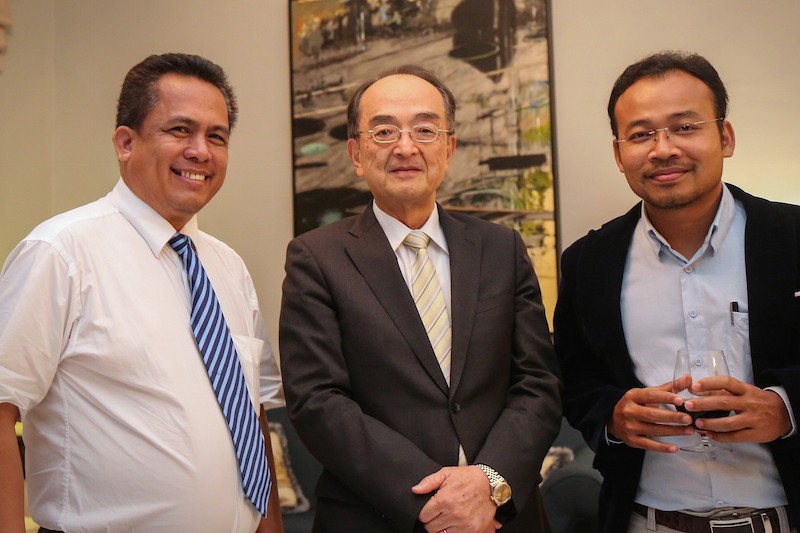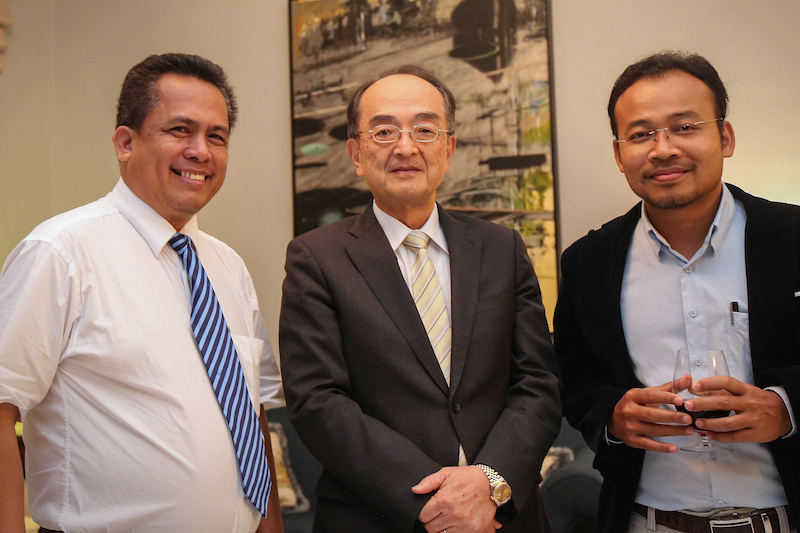Abrupt in an era in which many believed the old plague of government critics being assassinated had been extinguished, the execution-style slaying of Kem Ley as he sat for a coffee in Phnom Penh on Sunday morning sent shockwaves through the nation.
No more than 30 minutes after his assassin had fired two shots into the popular political analyst, images of his lifeless body lying in the mundane surrounds of a gas station convenience store sent people on all sides of politics into public grieving.

For many, the grief was because the 46-year-old had become a rare voice of reason on their radios, prepared to express growing discontent against an impulsively violent, corrupt and unresponsive political system in a way that few dared—for fear of the repercussions.
“He was known through his interviews on Radio Free Asia, the Voice of America, and he reminded us of what was going on—of the real situation,” said Son Soubert, a former member of the Constitutional Council, at the first day of Kem Ley’s wake on Monday.
Mr. Soubert said Kem Ley’s ability to explain complex political issues using everyday language, and without any apparent partisanship, had turned his voice into a powerful force in the past few years, as the ruling CPP has tried to stave off growing dissent.
“He knew how to explain in an ordinary way to the people about the political situation, and he knew how to make a balance by looking at both sides,” he said. “This was a political assassination.”
Sam Inn, a longtime friend and the secretary-general of the Grassroots Democracy Party, which Kem Ley helped create last year, said the analyst, who had studied as a medical doctor, grew so popular in part due to his eagerness to analyze everything.
“He did research at the request of NGOs, but in some cases just conducted his own research. If he was interested in something, he would spend his energy, time and resources to do it himself,” Mr. Inn said. “That was a part of his character that made him special.”
“But the most important part of why he became so popular was his great communication skills on the radio. The way he expressed his analytical findings, it attracted the listener,” he said. “It’s hard to explain, but he was a man who, when he speaks, you listen.”
Kem Ley’s broad interests and ability to turn complex political events into understandable stories bolstered his reputation after he began appearing regularly on radio after the 2013 election—with some of his comments even becoming headlines.
Joking in an interview with Thmey Thmey in May about a spate of arrests of critics of the ruling CPP, he said: “If the politicians or parties scared of criticism chose careers as potato farmers, that’d be better.” It was a readymade title for a viral story.
Yet the analyst had much more than snappy jokes in his repertoire. His highly critical explanations of machinations between the ruling and opposition parties allowed many independent outlets to bring a fuller perspective to their news coverage.
Sun Narin, the online manager for Voice of Democracy, which has a popular website and radio program, said Kem Ley was readily available for comment by telephone and eager to offer his perspective on the issues of the day.
“There are only a few political analysts, and he dared to say things more real compared to other analysts, who say things not always from the bottom of their hearts. I think people believed in what he said,” Mr. Narin said.
“It’s a great loss for journalism and for the country. He was very open, and his comments were always very scientific. He always had practical examples from his studies and from his observations.”
Indeed, Kem Ley was fond of starting any opinion, whether short or long, with the qualification “Based on my observations,” and often traveled to villages around the country for discussions or lectures, depending on what was requested.
He said he would go to any village that invited him—so long as they mustered a crowd of 80—and would promote the idea that people could take electoral control of their own communes by simply drinking less coffee.
“If you have 80 people, you should instead drink only one glass of coffee a day if you want to do politics in your commune,” Mr. Ley said during one such meeting in Battambang City in December 2014.
“Then if you each contribute about $1, you will have $80, and that’s enough to run a political party.”
A humble man fond of sports attire, he had arrived at the event in nylon tracksuit pants and a pair of red Nike Air Force One sneakers and spent four hours leading talks on grassroots politicking before driving off with his colleagues for another meeting.
Mr. Inn, who joined many such meetings, said it was Kem Ley’s eagerness to speak to real people about political issues that allowed him to return to programs like VOA and RFA and English-language outlets with analysis much deeper than many others.
“He wanted to know about the real problems and the real challenges that people are facing on the ground, and that was why he was keen to go down and listen to people and their problems, and then use that as a source for his analyses,” Mr. Inn said.
“When you met him, he was so humble, gentle and friendly. He touched people’s hearts. What I liked most about him was that he liked to criticize things but he aimed for improvement through critical feedback, to the government or the opposition,” he said.
“Unfortunately, I think much of his critical feedback to the government was rejected. It seemed to be painful to them, but that was never his intention.”
The analyst’s advocacy for local politics also belied an activist streak, however, and he was unafraid of advocating causes he believed worthy, including the fight against the planned Stung Cheay Areng hydropower dam in Koh Kong province.
The dam would inundate a 9,500-hectare area in the Areng valley, forcing about 1,300 ethnic Chong villagers from their homes and flooding the habitat of many threatened animal species.
Alex Gonzalez-Davidson, the head of the activist group Mother Nature that has led much of the campaign against the dam, said Kem Ley speaking out for the cause was a boon to his efforts.
“Several things made Kem Ley wildly popular, inspirational and charismatic,” Mr. Gonzalez-Davidson said. “Above all, he was the best at telling things how they truly were, using a language that was easily understood and remembered by the whole nation and saying it without the slightest hint of fear,” he said.
With the death of such a popular and respected figure, he added, “a new martyr has been created.”
Yet it will be his insightful comments carried by Cambodia’s few independent radio outlets that Kem Ley will best be remembered for. At his wake at Phnom Penh’s Wat Chas pagoda on Monday, mourners continued to stream in to offer condolences to his family—a pregnant wife and four sons—and share in their grief.
“He was my hero, as well as to other people,” said Sea Sokheng, a 52-year-old farmer from Kompong Cham province who made the trip to pay his respects to the man he said guided much of his political thought.
“He was never biased against this or that person. He told the truth…and his explanation and analyses were clear,” he said. “In my opinion, I do not think there was another person like him in Cambodia.”
(Additional reporting by Khuon Narim)




